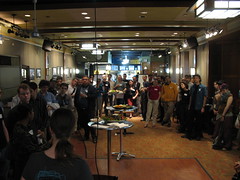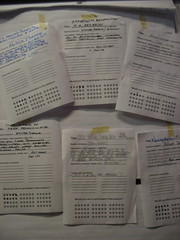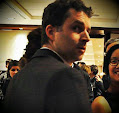 I'm writing this on the train back from SciBarCamp II in Toronto.
I'm writing this on the train back from SciBarCamp II in Toronto.To briefly sum up the experience, I've just spent an intense 24 hours in the company of quite a few admirable thinkers.
As the name suggests to people who know about BarCamps, the event was set up as an unconference. Attendance was
It really felt like the organizers knew what they were doing. No time was wasted. Pretty much all of the participants (two thirds of whom actually weren't at the first SciBarCamp) slipped seamlessly into the unconference mold.
 The participant makeup was quite diverse, with maybe half of the participants being scientists and others being businesspeople, technologists and artists with a strong interest in science. I was struck by the all-around open-mindedness and ability to speak in a jargon-free manner.
The participant makeup was quite diverse, with maybe half of the participants being scientists and others being businesspeople, technologists and artists with a strong interest in science. I was struck by the all-around open-mindedness and ability to speak in a jargon-free manner. The event went as follows: At the Friday evening reception, we spent 30 minutes on personal introductions, then had a mix & mingle session where people basically talked to whoever they liked, and filled in session proposal sheets. Around 30 such sheets were filled in. Then, participants were invited to go around the sheets and were able to comment on them and indicate interest by filling in circles below the session descriptions.
The event went as follows: At the Friday evening reception, we spent 30 minutes on personal introductions, then had a mix & mingle session where people basically talked to whoever they liked, and filled in session proposal sheets. Around 30 such sheets were filled in. Then, participants were invited to go around the sheets and were able to comment on them and indicate interest by filling in circles below the session descriptions.The interest indicators enabled the organizers to build Saturday's schedule on the fly. Rooms were allocated to sessions, with the more popular sessions obviously being put into larger rooms. A few proposals were merged together. The final schedule had five one-hour time slots, with 5 parallel sessions underway at any one time.
You can have a look at the schedule here. Two sessions especially stood out for me. The first was Joel Sachs and Jesse Greener's session on citizen science. The second was Michael Nielsen's talk on open mass collaboration in mathematics. I will cover them in upcoming posts.
I especially appreciated the opportunity to meet again with WorldChangers Hassan Masum, Mark Tovey and Karl Schroeder, and I was stoked to shake hands with quantum-information-authority-turned-science-futurist Michael Nielsen for the first time. It was also a great pleasure to meet new people like physicist Rob Spekkens and Kaitlin "I am not a lawyer" Thaney from Science Commons.
Huge kudos to Eva Amsen, Christine Buske, Jen Dodd, Jamie McQuay, Mark Tovey and Sunny Tsang, who pulled this event off, well, flawlessly on a shoestring budget.
I think a Montreal SciBarCamp will obviously need to happen at some point. However, it feels like the requisite network has yet to gel together. (Either that, or I haven't connected to it for some reason.)
Update: Here is Glendon Mellow's report on SciBarCamp.

